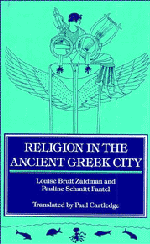Book contents
- Frontmatter
- Contents
- List of illustrations
- Author's preface to the English translation
- Translator's introduction
- List of sources
- PART I Introduction: How should we study Greek civic religion?
- 1 The necessity of cultural estrangement
- 2 Some fundamental notions
- 3 Sources of evidence
- PART II Cult-practices
- PART III Systems for representing the divine
- PART IV Envoi
- Appendixes
- Bibliography
- Index
2 - Some fundamental notions
Published online by Cambridge University Press: 05 June 2012
- Frontmatter
- Contents
- List of illustrations
- Author's preface to the English translation
- Translator's introduction
- List of sources
- PART I Introduction: How should we study Greek civic religion?
- 1 The necessity of cultural estrangement
- 2 Some fundamental notions
- 3 Sources of evidence
- PART II Cult-practices
- PART III Systems for representing the divine
- PART IV Envoi
- Appendixes
- Bibliography
- Index
Summary
One of the problems inherent in the study of Greek religion stems from the fact that basic concepts such as the sacred, purity and pollution, and piety and impiety, had special meanings for the Greeks that do not correspond to those with which we are familiar.
THE SACRED
Any study of religion has to deal with the notion of the sacred, but in the world of the Greek cities the opposition between the sacred and the profane – which we assume to be fundamental in the area of religion – was either blurred or utterly irrelevant.
The Greek language distinguished, rather, by means of such terms as hieron, hosion and hagion, a number of concepts that we lump together under the heading of ‘the sacred’. Thus ta hiera designated the cults and sanctuaries of the gods, but also sacrificial victims. The latter, in other words, were objects endowed by ritual with qualities that brought them into relation with the divine and thus caused them to enter the domain we label ‘sacred’. These acts, these places, these objects were endowed with a power that rendered them conducive or favourable to the efficacy of the ritual. However, nothing in their intrinsic nature distinguished them from objects of everyday use, either the implements that were employed in sacrificial cooking (knives, spits, cauldrons) or the food (bread, cakes, fruit) that was transformed into sacred offerings by being deposited in consecrated places.
- Type
- Chapter
- Information
- Religion in the Ancient Greek City , pp. 8 - 15Publisher: Cambridge University PressPrint publication year: 1992



